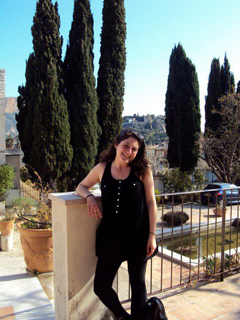Shabbat brings familiarity in France
Permanent link All PostsThe Frashley Chronicles, Part 4

Here's a little background about me, I spent the 2010-2011 school year teaching English in Grenoble, France. Before that, I spent a year working in the heart of Chicago in the Jewish non-profit community. When I was abroad, my eyes were opened to the everyday experience of the Jewish community in my town and in the country at large. I experienced what it meant to me to be not only Jewish in France, but a Jewish, young, female, American in France. It was a ridiculously fun, thought-provoking and thrilling seven months and I'm excited to share these stories. By the way, all thoughts and opinions are purely my own…I take full responsibility for any sweeping generalizations. With that out of the way, let's start at the very beginning (a very good place to start).
Looking in the mirror, I almost didn’t recognize myself. Dressed in black skirt down to my ankles and a long-sleeve black shirt, just a little light blush on my cheeks, I was definitely sporting a new look. I felt subdued, perhaps even a little out of uniform without my usual skinny jeans and fall sweater. I don’t often go to synagogue, but today I was making my first-ever outing to a Modern Orthodox shul with my French hosts. Looking into the mirror once again, I tried on my most devout expression.
“You look beautiful!” Mrs B. exclaimed as I gingerly walked down the stairwell. I was wearing her outfit, of course, and it didn’t fit badly at all. I put on my coat and off we went. The streets were quiet on a Saturday morning, most of the people in town taking it easy. I trailed behind Mr. and Mrs. B and their two sons. It was a very rainy morning and I walked carefully as we wandered down one of the main drags in the city. I felt strangely self-conscious. During my time in France, I’d very rarely, if ever, seen religious Jews walking to shul on a Saturday morning. But there I was, part of this fray, feeling even more foreign in this already foreign land. We approached a heavy wooden door, Mr. B. entered a code and we all slowly slipped inside.
Where we entered was a small building, moderately lit, and already filled with chatter and prayer. Mr. and Mrs. B. greeted all of their friends with the “bisou,” the customary French greeting. Wisely, I kept to myself, waiting to be introduced to the others at shul. I folded my hands in my lap as Mrs. B. and I took our place at the back of the synagogue, behind the small partition dividing the men and the women.
I wondered if the service would be led in French, but the elderly rabbi led his congregation entirely in Hebrew. We arrived near the end of the service. As I stood up to say the “Aleinu,” reciting from memory words I’d spoken many times before at services in the Chicago burbs, I felt a comforting wave of familiarity. In my day-to-day life in France, I’d been working so hard to make friends, make myself understandable to the French, to navigate tasks that took no thought in English, but now required immense concentration in French. There were times I questioned if I would ever feel welcome, if I would ever feel truly understood. As I recited the prayers with the same fluency of the women sitting around me, I felt competent and I felt, for that brief moment, completely un-foreign.
The members of the shul filtered into a little room filled with tables for a Shabbat feast. I dutifully took my seat next to my host mother. I gleefully played the role of “American Girl,” answering everyone’s questions, smiling brightly, gesturing wildly, my apple cheeks turning rosy when I wasn’t sure if I’d heard so-and-so correctly. There were many girls joining their parents, but not nearly as many boys. I turned to Malka, the girl sitting next to me, I told her she shared a name with my grandmother and that quickly got us chatting. I asked where all the boys were, to which she replied, “oh, they’re all away at yeshiva at the next big town over.”
After a robust afternoon of chatting and eating, or in my case, being told to “eat more!” the B. family gathered themselves and headed toward the door. “Yalla!” I called, as I saw my host brother dawdling. My host father looked at me and laughed. On the walk home, my host mother asked what I thought. “I liked it,” I remarked. I was tired, I didn’t have much more to say. Compared to my everyday life in Chicago, going to a modern Orthodox shul was one of the most different experiences I’ve encountered living abroad. It took me outside of my comfort zone and showed me a world I know about, but very rarely see and experience. I was never once pressed about my “sort” of Judaism, whether I was reform or conservative; I was never asked how I practice or how often I pray. They extended an invite simply because I am a Jew, and it was Shabbat. And that small gesture made me feel quite at home.



.jpg)



